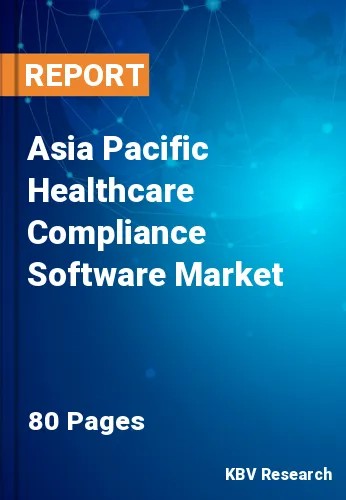The Asia Pacific Healthcare Compliance Software Market would witness market growth of 11.6% CAGR during the forecast period (2022-2028).
Healthcare professionals can devote more time to important tasks by automating HIPAA compliance. Automating HIPAA compliance would aid in automating ongoing regulatory tasks. Employees can concentrate on making strategic decisions and guiding the healthcare business in more lucrative directions since this responsibility is in the "safe hands" of the automation tool. Healthcare compliance automation can assist healthcare providers in enhancing patient care by reallocating time previously spent on manual, prone-to-error procedures to more strategic ones.
Because laws protecting patient data are governed by federal law, severe penalties and fines are imposed for privacy violations and non-compliance. By automating compliance, lowering the possibility of human mistakes, and constantly adhering to compliance policy, healthcare players may ensure they carry out their due diligence. Even if there is a data breach, maintaining compliance and adhering to the right disclosure protocol can reduce expenses.
No impartial government audit confirms compliance with HIPAA, HITECH, or PHIPA. When a compliance violation is allegedly occurring, the concerned government authorities conduct formal audits and investigations. By putting in place a thorough and effective self-assessment system to verify policy and procedural compliance, healthcare organizations can prevent the OCR from auditing them.
The MoHFW has launched several e-Gov initiatives in the Indian healthcare sector under the banner of the eHealth division to further the Digital India goal. The application of information and communication technology (ICT) for health is known as e-Health. One of the goals of e-Health is to save expenses by improving healthcare efficiency. Avoiding redundant or unneeded diagnostic or therapeutic interventions, improving communication across healthcare organizations, and involving patients are all potential ways to cut expenses. Considering these aspects, the healthcare compliance software market would grow in this region.
The China market dominated the Asia Pacific Healthcare Compliance Software Market by Country in 2021, and would continue to be a dominant market till 2028; thereby, achieving a market value of $351.3 Million by 2028. The Japan market is experiencing a CAGR of 11% during (2022 - 2028). Additionally, The India market would exhibit a CAGR of 12.3% during (2022 - 2028).
Based on End-use, the market is segmented into Hospitals, Specialty Clinics and Others. Based on Product Type, the market is segmented into Cloud and On-premise. Based on Category, the market is segmented into Policy & Procedure Management, Medical Billing & Coding, License, Certificate, & Contract Tracking, Training Management & Tracking, Auditing Tools, Incident Management and Accreditation Management. Based on countries, the market is segmented into China, Japan, India, South Korea, Singapore, Malaysia, and Rest of Asia Pacific.
Free Valuable Insights: The Worldwide Healthcare Compliance Software Market is Projected to reach USD 5 Billion by 2028, at a CAGR of 10.5%
The market research report covers the analysis of key stake holders of the market. Key companies profiled in the report include RLDatix, HealthStream, Inc., Atlantic.Net, Inc., Healthicity, LLC (SixSails), ConvergePoint, Inc., Beacon Healthcare Systems, Inc., Complinity Technologies Pvt. Ltd., Sprinto Technology Private Limited, Panacea Healthcare Solutions, Inc. (Besler & Co., Inc.), and Smartgate Solutions Ltd. (Radar Healthcare)
By End-use
By Product Type
By Category
By Country
Our team of dedicated experts can provide you with attractive expansion opportunities for your business.

